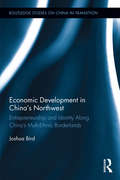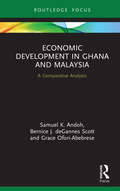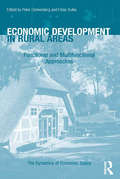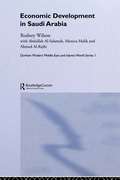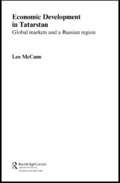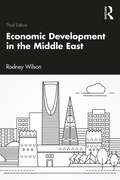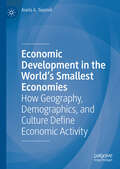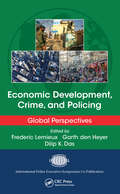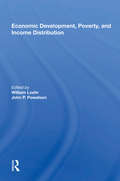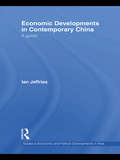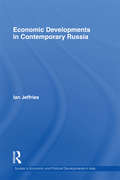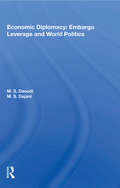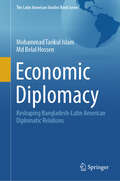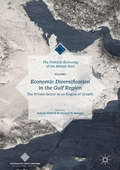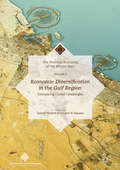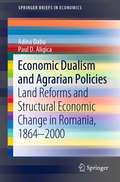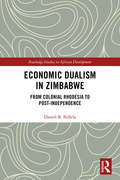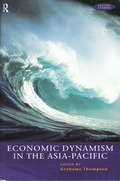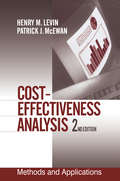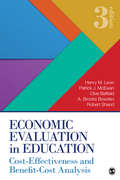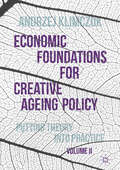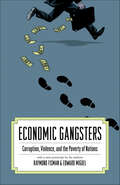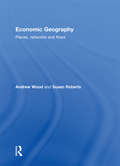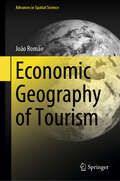- Table View
- List View
Economic Development in China's Northwest: Entrepreneurship and identity along China’s multi-ethnic borderlands (Routledge Studies on China in Transition)
by Joshua BirdUnder the ethnic affairs management regime established by the People’s Republic of China, every Chinese citizen is classified within one of 56 state-recognised ‘nationalities’. Government policy assumes that these nationalities differ from one another primarily in their levels of economic development, and asserts that ethnic divisions and identities fade with the gradual achievement of economic and social equality. As a result, economic development policy in minority nationality areas has often constituted a replica of the model which has already proven successful in China’s Han-Chinese dominated east. Research conducted across five locations in China’s Northwest paints a far more complex picture, however. This book considers for the first time how identity informs the nature of economic participation among ethnic minority entrepreneurs in China’s remote Northwest. Through interviews with entrepreneurs from diverse backgrounds, including Tibetan, Han and Muslim Chinese, this book highlights how ethnic—and other—identities inform the nature of economic participation. Furthermore, it explores the broader implications of this de-facto economic segregation for China’s ongoing social harmony and political stability. Ultimately, this book demonstrates how economic participation, even when successful in achieving its economic outcomes, may actually serve to reinforce and strengthen minority national identity—perhaps even at the expense of national Chinese identity. This book will be useful for students and scholars of Chinese Studies, Ethnic Studies and Economics.
Economic Development in Ghana and Malaysia: A Comparative Analysis (Routledge Explorations in Development Studies)
by Samuel K. Andoh Bernice J. deGannes Scott Grace Ofori-AbebreseEconomic Development in Ghana and Malaysia investigates why two countries that appeared to be at more or less the same stage of economic development at one point in time have diverged so substantially. At the time of their independence from the UK in 1957, both Ghana and Malaysia were at roughly the same stage of economic development; in fact, Ghana’s real per capita income was slightly ahead of Malaysia’s. Since then, Ghana’s development has been sluggish, while Malaysia’s economy has taken off into sustained growth and today, the real per capita income of Malaysia is about five times that of Ghana. This volume examines the pre-colonial and colonial economies of both countries, and the economic policies pursued after independence. In doing so, it aims to identify policies which might have contributed to Malaysia’s development and those which might have slowed Ghana’s. The authors ask whether lessons can be learned from the successes of countries such as Malaysia. This detailed comparative analysis will be useful to students and researchers of development economics as well as public policy makers in developing countries. It is written in language which makes it accessible to the general reader.
Economic Development in Rural Areas: Functional and Multifunctional Approaches (The Dynamics of Economic Space)
by Elmar Kulke Peter DannenbergAnalysing the ongoing changes and dynamics in rural development from a functional perspective through a series of case studies from the global north and south, this volume deepens our understanding of the importance of new functional and multifunctional approaches in policy, practice and theory. In rural areas of industrialized societies, food production as a basis for growth and employment has been declining for many decades. In the Global South, on the other hand, food production is still often the most important factor for socio-economic development. However, rural areas both in the industrialized north and in the global south are facing new challenges which lead to significant changes and threats to their development. New forms of food production, but also new functional (e.g. housing or business parks) and often multifunctional approaches are being discussed and practiced yet it remains unclear the extent to which these result in better or more sustainable development of rural areas.
Economic Development in Saudi Arabia (Durham Modern Middle East and Islamic World Series)
by Rodney Wilson Monica Malik Ahmed Al Rajhi Abdullah Al SalamahThe changing political situation in the Middle East poses challenges for the economies of the region, and some see none more vulnerable to collapse than Saudi Arabia's. Yet as this study demonstrates, the fundamentals of the Kingdom's economy are relatively robust, as over three quarters of GDP is accounted for by the non-oil sector, and impressive modern industries have been established, notably in petrochemicals. The financial system functions well, and despite substantial government debts, there is low inflation and currency stability. The private sector increasingly drives the economy, although job creation has been insufficient to prevent rising youth unemployment. The development challenges Saudi Arabia faces are similar to those of other middle-income countries, and three decades of diversification have made the economy less unique than it was in the oil boom years of the 1970s.
Economic Development in Tatarstan: Global Markets and a Russian Region (Routledge Contemporary Russia and Eastern Europe Series #Vol. 4)
by Leo McCannBased on extensive original research in the Republic of Tatarstan, in the Central Volga region of Russia, this book examines the economic development path followed by Tatarstan since the collapse of the Soviet Union and the Russian financial crash of 1998. It argues that the roles of global capitalism and globalisation are somewhat exaggerated in much contemporary academic literature. In the case of Tatarstan, a strong state role, tightly-knit local elite networks, and the inheritance of the Soviet politic and industrial systems are the most important socio-economic formations in explaining the region's development.
Economic Development in the Middle East
by Rodney WilsonThis new edition examines how development in the Middle East is being influenced by global economic change. This comparative textbook focuses on the region’s strengths, and highlights development success, especially in the Gulf, Turkey and Israel. The major structural changes in the economies of the Middle East are analysed and current employment challenges are discussed. The impact of demographic changes is considered, notably the dramatic decline in birth rates which will have implications for future employment. The contribution of banks and capital markets to the region’s development is appraised, including that of Islamic financial institutions which play a prominent role in the Gulf Cooperation Council (GCC) countries but are on the margins of the financial systems elsewhere. Historically, development in the GCC was linked to oil and gas production and prices, a key issue being whether these are being decoupled as economies diversify and become more self-sustaining. The evidence on this from the GCC is encouraging, with transparent and accountable financial management and major improvements in economic governance despite the lack of democracy. Examining the drivers of economic development in the Middle East in a regional and global context, this fully updated textbook is a key resource for students and academics interested in economic development and the political economy of the Middle East.
Economic Development in the World's Smallest Economies: How Geography, Demographics, and Culture Define Economic Activity
by Aneta A. TeperekThis book examines three fundamental factors that influence the economic growth and development of the world's 93 smallest economies, which together produced 1% of global GDP. The objective of the study is to ascertain whether the countries analysed possess the requisite environmental resources, human capital, and cultural conducive to economic development, and whether they effectively utilize their resources. Consequently, the location and elements of physical geography are analyzed, including climate, soils, landforms and geological structure from the perspective of mineral resources abundance as well as marine and inland water from the perspective of water resource abundance. The changes in population from 1970 to 2019 are studied and the factors determining them, which are natural increase and migration. Finally, the demographic structure are examined. The analysis of cultures, including religions and languages, is undertaken to identify cultural factors that either support or hinder economic growth and development. This book is designed for students and researchers engaged in the study of economic geography, geography, demography, and macroeconomics. It serves as a valuable resource for international organizations engaged in the analysis of countries across the globe.
Economic Development, Crime, and Policing: Global Perspectives (International Police Executive Symposium Co-Publications)
by Dilip K. Das Frederic Lemieux Garth Den HeyerThe 22nd Annual Meeting of the International Police Executive Symposium was held in August 2012 at the United Nations Plaza in New York. Chaired by Dr. Garth den Heyer, the symposium focused on the links between economic development, armed violence, and public safety. Drawn from these proceedings, Economic Development, Crime, and Policing: Global P
Economic Development, Poverty, And Income Distribution
by John P. Powelson William LoehrThe increasing inequality and poverty that seem inevitably to accompany economic growth in developing countries have become more and more evident in recent years. The search for development paths that lead to growth with equality—all too difficult to find—is now an area of central concern for development economists. One result of their concern is this volume, in which internationally known representatives of a range of disciplines address themselves to ways in which growth with equity might be successfully achieved. The book begins with both empirical and theoretical background to the development issues involved, and with an overview of the experience of the international development assistance community. focuses on operational definitions of the poor that will permit analytical, policy-oriented research to lead to useful conclusions. Specific concern is expressed for small-business owners, women, peasants, and recent migrants from rural to urban areas. The basic question, of course, is what can be done about poverty and inequality. includes suggestions for specific measures and provides a comprehensive comparison across a wide range of policy options. The book does not solve the problem, but it does point to directions that promise a reasonably high probability of success. And throughout, suggestions are made for the kind of interdisciplinary research required to raise that probability even further.
Economic Developments in Contemporary China: A Guide (Guides to Economic and Political Developments in Asia)
by Ian JeffriesChina’s role in global affairs today continues to rise. This book provides an authoritative, comprehensive and detailed overview of contemporary economic developments in China. Key topics include agriculture; the market gradually replacing central planning; the global financial crisis; the reform of state-owned industrial enterprises; the non-state sectors; the ‘open-door’ policy (including the WTO, exchange rate policy, and inward and outward direct foreign investment); and China’s economic performance in general. The book continues - and adds to – the overview of developments up to May 2006 which were covered in the author’s China: A Guide to Economic and Political Developments (2006), and is the companion volume to Political Developments in Contemporary China: A Guide (2010) - both published by Routledge.
Economic Developments in Contemporary Russia (Guides to Economic and Political Developments in Asia)
by Ian JeffriesThis book provides a comprehensive overview of Russia’s difficult economic transition from a command economy since the early 1990s. It covers the financial crisis of August 1998 and the global financial crisis a decade later. Key subjects covered include economic transition, privatization and liberalization; changes in land ownership and agriculture; energy; foreign direct investment; economic stabilization; and economic performance. Russia is well endowed with raw materials, especially oil and natural gas; this book argues that in some ways this has not helped Russia’s attempts to become a more diversified and high-tech economy. Overall, the book demonstrates how much the Russian economy has changed in the period. It continues - and adds to – the overview of developments in the author’s The New Russia (2002), and is the companion volume to Political Developments in Contemporary Russia (2011) - both published by Routledge.
Economic Diplomacy: Embargo Leverage And World Politics
by M. S. DaoudiThe 1983 collapse of world oil prices revived memories of a time only a decade earlier when the price of a barrel of oil did not exceed three dollars. By the late 1970s, spot market prices had reached peaks of forty dollars a barrel. A major role in creating these new realities was played by the 1973/1974 Arab oil embargo, which formed the psychological, political, and market conditions for the dramatic price surge. This important study probes the embargo in detail, thoroughly examining its history, the motivations that caused it, and its ripple effect on world politics and the international economic order. The authors carefully examine the interruption of oil supplies to Western Europe during the 1956 Suez Canal crisis, the growing momentum of Arab oil leverage beginning with the First Arab Petroleum Congress in 1959, the decline of the oil companies' domination of the petroleum industry, and the Arab political environment between the 1967 Arab defeat and the 1973 Arab oil embargo. The book concludes with a chapter addressing the lessons to be learned from these recent embargoes.
Economic Diplomacy: Reshaping Bangladesh-Latin American Diplomatic Relations (The Latin American Studies Book Series)
by Mohammad Tarikul Islam Md Belal HossenEconomic diplomacy has become more notable in recent years, helping developing nations like Bangladesh maximise their national interests. Bangladesh is rapidly transitioning from a low-income to a middle-income nation, with the goal of reaching developed status by 2041. Bangladesh engages in international trade with almost every country. Nevertheless, a considerable amount of global trade demonstrates a strong reliance on specific nations. Decreasing trade dependence is required to transition from an emerging economy to a high-income, financially independent nation. Having gained its independence more than 50 years ago, Bangladesh has been slow to form bilateral partnerships and expand its economic activity. Consequently, Bangladesh remains dependent on China and India for imports, while focusing on America and Europe for exports. As a result of this economic interdependence, the dominant global powers enjoy the potential to pursue a proactive stance in the domestic affairs of Bangladesh. By taking steps to decrease its dependency on conventional trading partners, Bangladesh can increase the emphasis on non-traditional trading partners like Latin American and African countries. The formation and growth of a comprehensive economic diplomacy framework is required in this context. The aforementioned reasons generated the idea for a research investigation of Bangladesh's economic diplomacy with Latin America. Argentina now wishes to reopen their embassy in Bangladesh, spurred on by the extraordinary support the people of Bangladesh have shown for their country during the World Cup. In an effort to establish a Mexican embassy in Dhaka, Mexican Foreign Minister Marcelo Ebrard Casaubon is expected to visit the city in March as part of a high-level group. This study shows that geographical distance and cultural differences do not have a substantial impact on building a market position in the Latin American region. Promoting Bangladesh through public diplomacy in the region can assist the country in increasing its portion of international trade. However, this requires a suitable framework for Economic Diplomacy. The book examines prospective economic diplomacy methods for Bangladesh. This book offers fresh perspectives on various facets of Bangladesh's expanding trade relations with Latin America.
Economic Diversification in the Gulf Region, Volume I
by Ashraf Mishrif Yousuf Al BalushiThis volume focuses on the role of the private sector in diversifying the economics of Gulf countries in the post-petrodollar era, when fluctuating and declining oil prices are negatively impacting national expenditures. It explores current policies of countries in the Gulf Cooperation Council and their efforts to shift their economies away from heavy dependence on hydrocarbons. The structural changes will create favorable conditions for the private sector to flourish, shift production dependence from public to private sector, and allow for more efficient resource allocation. Such changes will also allow local banks to provide financial support to small and medium enterprises, boost entrepreneurship for job creation, and strengthen organizational structure and efficiency. This is the first volume in Economic Diversification in the Gulf Region.
Economic Diversification in the Gulf Region, Volume II
by Ashraf Mishrif Yousuf Al BalushiThis volume explores the challenges to diversification in Gulf countries, which can no longer rely on profits from hydrocarbons to fund national expenditures. It elaborates on the problem of weak institutions, lack of coordination between policy makers and executors, limited investment in research and development, and a workforce that is too poorly skilled to compete in the private sector. In addition to analyzing issues in areas such as education, labor, business, and trade, the contributors underscore the importance of using global best practices to overcome fundamental weaknesses in the Gulf Cooperative Council's economic structure that limit opportunities for economic diversification.This is the second volume in Economic Diversification in the Gulf Region.
Economic Dualism and Agrarian Policies: Land Reforms and Structural Economic Change in Romania, 1864–2000 (SpringerBriefs in Economics)
by Adina Dabu Paul D. AligicaThis book offers an in-depth case study of Romania’s land and agricultural reforms from mid-19th century and up to 2000, offering a historical account of agricultural reforms in post-communist Romania in the light of more than a century of social and economic development experiments. Taking a ‘dual economy’ analytic perspective, the book examines the impact of structural and agricultural reforms on the country's economic development and provides an analysis of the ideas and models that stood behind policy reforms aiming at the modernization of an economy and society defined by dualism and late development.
Economic Dualism in Zimbabwe: From Colonial Rhodesia to Post-Independence (Routledge Studies in African Development)
by Daniel B. NdlelaThis book identifies the root causes of income inequality in underdeveloped economies and proposes new solutions for structural reform in economies that have long neglected and exploited working people. It focuses on the case of Zimbabwe, a classic example of an African post-colonial state continuing with dualistic economic structures while simultaneously laying the blame for the initiation of this form of underdevelopment with colonialism. The book explores the colonial roots of economic dualism, in which traditional sectors run alongside newer forms of wage employment, and suggests ways for Zimbabwe to move beyond the ingrained inequalities and asymmetries in production and organisation that it generates. Using a combination of theoretical and empirical approaches, Economic Dualism in Zimbabwe demonstrates how economic dualism can be eliminated through structural transformation of the traditional agricultural sector and reallocation of labour across sectors. The author comprehensively discusses the origins of dualism in Zimbabwe, how it developed in land, labour, credit and financial markets, who stands to gain and lose from it, and ultimately what reforms are needed to eliminate dualism from the economic system. The book aims to complement efforts made by both North and South to transform this structurally embedded cause of underdevelopment and seeks to motivate change in the collective development agenda mindset. This book will be of interest to graduate-level students, scholars, researchers and policy practitioners in the fields of Development Studies, Economics, Agricultural Policy, Labour Policy, Economic Planning and African Studies.
Economic Dynamism in the Asia-Pacific: The Growth of Integration and Competitiveness
by Grahame ThompsonThis broad-ranging student textbook examines the rise of the Asia-Pacific as an important economic region. It looks at the sources of that rise, its future development and the possible consequences for the global economy. The analysis is divided into three sections considering:* how far the Asia-Pacific has developed as a regional system, looking at the patterns of integration of the principal economies* the relationship between the key individual economies of Japan, Korea, China and the United States* how the rise of the Asia-Pacific economy has affected the international economic system.In so doing it provides much-needed insights not only into the growth of this powerful economic region, but also the international context of Asia-Pacific development.
Economic Evaluation in Education: Cost-Effectiveness and Benefit-Cost Analysis
by Henry M. Levin Patrick J. McEwan Clive R. Belfield A. Brooks Bowden Robert D. ShandThe past decade has seen increased attention to cost-effectiveness and benefit-cost analysis in education as administrators are being asked to accomplish more with the same or even fewer resources, philanthropists are keen to calculate their “return on investment” in social programs, and the general public is increasingly scrutinizing how resources are allocated to schools and colleges. Economic Evaluation in Education: Cost-Effectiveness and Benefit-Cost Analysis (titled Cost-Effectiveness Analysis: Methods and Applications in its previous editions) is the only full-length book to provide readers with the step-by-step methods they need to plan and implement a benefit-cost analysis in education. Authors Henry M. Levin, Patrick J. McEwan, Clive Belfield, Alyshia Brooks Bowden, and Robert Shand examine a range of issues, including how to identify, measure, and distribute costs; how to measure effectiveness, utility, and benefits; and how to incorporate cost evaluations into the decision-making process. The updates to the Third Edition reflect the considerable methodological development in the evaluation literature, and the greater empiricism practiced by education researchers, to help readers learn to apply more advanced methods to their own analyses.
Economic Evaluation in Education: Cost-Effectiveness and Benefit-Cost Analysis
by Henry M. Levin Patrick J. McEwan Clive R. Belfield A. Brooks Bowden Robert D. ShandThe past decade has seen increased attention to cost-effectiveness and benefit-cost analysis in education as administrators are being asked to accomplish more with the same or even fewer resources, philanthropists are keen to calculate their "return on investment" in social programs, and the general public is increasingly scrutinizing how resources are allocated to schools and colleges. This text (titled Cost-Effectiveness Analysis in its previous editions) is the only full-length book to provide readers with the step-by-step methods they need to plan and implement a benefit-cost analysis in education. The authors examine a range of issues, including how to identify, measure, and distribute costs; how to measure effectiveness, utility, and benefits; and how to incorporate cost evaluations into the decision-making process. The updates to the Third Edition reflect the considerable methodological development in the evaluation literature, and the greater empiricism practiced by education researchers, to help readers learn to apply more advanced methods to their own analyses. SAGE congratulates author Henry M. Levin, winner of the 2017 AERA Distinguished Contributions to Research in Education Award.
Economic Evaluation in Education: Cost-Effectiveness and Benefit-Cost Analysis
by Henry M. Levin Patrick J. McEwan Clive R. Belfield A. Brooks Bowden Robert D. ShandThe past decade has seen increased attention to cost-effectiveness and benefit-cost analysis in education as administrators are being asked to accomplish more with the same or even fewer resources, philanthropists are keen to calculate their "return on investment" in social programs, and the general public is increasingly scrutinizing how resources are allocated to schools and colleges. This text (titled Cost-Effectiveness Analysis in its previous editions) is the only full-length book to provide readers with the step-by-step methods they need to plan and implement a benefit-cost analysis in education. The authors examine a range of issues, including how to identify, measure, and distribute costs; how to measure effectiveness, utility, and benefits; and how to incorporate cost evaluations into the decision-making process. The updates to the Third Edition reflect the considerable methodological development in the evaluation literature, and the greater empiricism practiced by education researchers, to help readers learn to apply more advanced methods to their own analyses. SAGE congratulates author Henry M. Levin, winner of the 2017 AERA Distinguished Contributions to Research in Education Award.
Economic Foundations for Creative Ageing Policy, Volume II
by Andrzej KlimczukAging populations are a major consideration for socio-economic development in the early 21st century. This demographic change is mainly seen as a threat rather than as an opportunity to improve the quality of human life. Aging population is taking place in every continent of the world with Europe in the least favourable situation due to its aging population and reduction in economic competitiveness. Economic Foundations for Creative Aging Policy offers public policy ideas to construct positive answers for ageing populations. This exciting new volume searches for economic solutions that can enable effective social policy concerning the elderly. Klimczuk covers theoretical analysis and case study descriptions of good practices, to suggest strategies that could be internationally popularised.
Economic Gangsters: Corruption, Violence, and the Poverty of Nations
by Edward Miguel Ray FismanGetting inside the heads of the developing world’s dictators, warlords, and corrupt politiciansMeet the economic gangster. He's the United Nations diplomat who double-parks his Mercedes on New York City streets at rush hour because the cops can't touch him—he has diplomatic immunity. He's the Chinese smuggler who dodges tariffs by magically transforming frozen chickens into frozen turkeys. The dictator, the warlord, the unscrupulous bureaucrat who bilks the developing world of billions in aid. The calculating crook who views stealing and murder as just another part of his business strategy. And, in the wrong set of circumstances, he might just be you.In Economic Gangsters, Raymond Fisman and Edward Miguel take readers into the secretive, chaotic, and brutal worlds inhabited by these lawless and violent thugs. Join these two sleuthing economists as they follow the foreign aid money trail into the grasping hands of corrupt governments and shady underworld characters. Spend time with ingenious black marketeers as they game the international system. Follow the steep rise and fall of stock prices of companies with unseemly connections to Indonesia's former dictator. See for yourself what rainfall has to do with witch killings in Tanzania—and more.Fisman and Miguel use economics to get inside the heads of these "gangsters," and propose solutions that can make a difference to the world's poor—including cash infusions to defuse violence in times of drought, and steering the World Bank away from aid programs most susceptible to corruption.In a new postscript, the authors look at how economists might use new tools to better understand, and fight back against, corruption and violence in the aftermath of the 2008 financial crisis. Take an entertaining walk on the dark side of global economic development with Economic Gangsters.
Economic Geography
by Andrew Wood Susan RobertsThe turbulence of the current times has dramatically transformed the world's economic geographies. The scale and scope of such changes require urgent attention. With intellectual roots dating to the nineteenth century, economic geography has traditionally sought to examine the spatial distributions of economic activity and the principles that account for them. More recently, the field has turned its attention to a range of questions relating to: globalization and its impact on different peoples and places; economic inequalities at different geographic scales; the development of the knowledge-based economy; and the relationship between economy and environment. Now, more than ever, the changing fortunes of peoples and places demands our attention. Economic Geography provides a stimulating and innovative introduction to economic geography by establishing the substantive concerns of economic geographers, the methods deployed to study them, the key concepts and theories that animate the field, and the major issues generating debate. This book is the first to address the diverse approaches to economic geography as well as the constantly shifting economic geographies on the ground. It encompasses traditional approaches, albeit from a critical perspective, while providing a thorough, accessible and engaging examination of the concerns, methods and approaches of the 'new economic geography'. This unique introductory text covers the breadth of economic geography while engaging with a range of contemporary debates at the cutting-edge of the field. Written in an accessible and lucid style, this book offers a thorough and systematic introductory survey. It is enhanced by pedagogical features throughout including case studies dealing with topics ranging from the head office locations of the Fortune 500, Mexico's maquiladoras to China's investments in Southern Africa. This book also contains exercises based on the key concepts and annotated further reading and websites.
Economic Geography of Tourism (Advances in Spatial Science)
by João RomãoThis book provides an in-depth exploration of the dynamic intersections between economic geography and tourism, highlighting how spatial, economic, and social processes shape tourism development—and how tourism, in turn, transforms economic spaces. Combining theoretical insights with real-world case studies, it offers a comprehensive understanding of tourism&’s evolving role within economic geography. The first part lays a strong theoretical foundation, introducing key concepts such as the Tourism Area Life Cycle, path dependence, agglomeration economies, smart specialization, and regional resilience within the context of tourism research. It explores spatial and temporal patterns in tourism development, the growing influence of digitalization and smart tourism, and the roles of innovation and competitiveness in shaping destination dynamics. The second part shifts focus to tourism&’s broader economic and social implications. It critically assesses urban tourism&’s links to gentrification, circular economies, and social conflicts while exploring strategies to address spatial enclaves and foster integrated tourism networks in low-density and fragile regions. Environmental challenges, including the impact of tourism mobility on local communities and ecosystems, are also examined. The book concludes by addressing the tensions and future trajectories of tourism development, questioning whether sustainable or regenerative tourism can thrive within market-driven economies where decision-making prioritizes individual preferences over collective well-being. It calls for a reassessment of contemporary policy and regulatory frameworks to align tourism with broader economic and environmental goals. By bridging economic geography and tourism studies, this book equips scholars, policymakers, and practitioners with analytical tools to rethink tourism development and advocate for strategies that are economically viable and effectively sustainable, inclusive and resilient.
